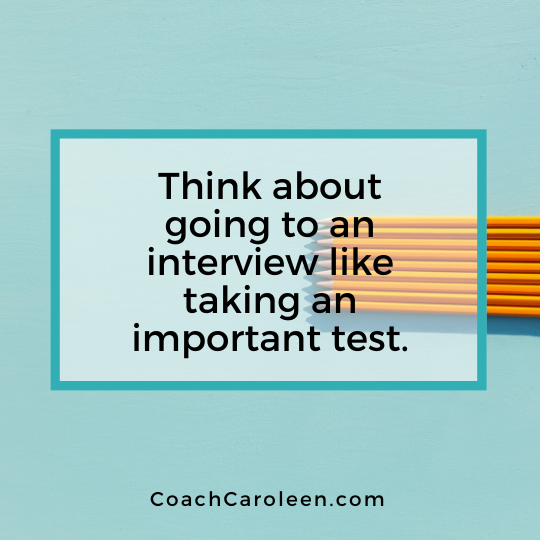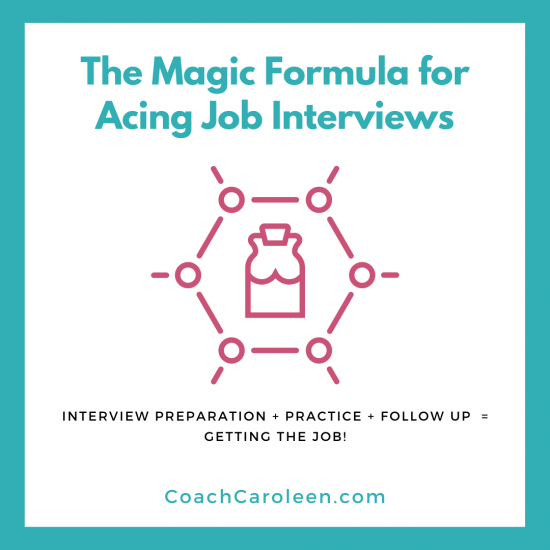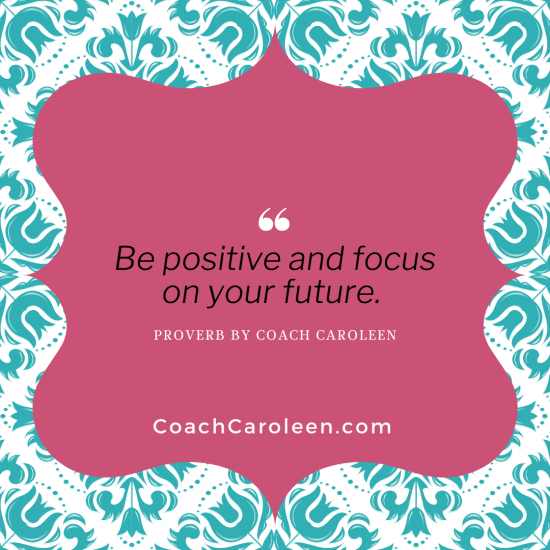Additional menu
Have you ever walked into a test and knew you were going to ace it? You knew that no matter what the teacher came up with, you’d be ready. You were confident you’d make the grade.
Think about going to an interview like taking a big important test. Would you walk in unprepared? Would you not bother to study or take practice tests? If you didn’t spend any time to prepare and practice, would you expect to make a good grade?

Of course, during an interview, similar to a test, there’s no way that you will know exactly what they’ll ask. Larger companies may actually have a prescribed list of questions. Other companies may have a few questions to start and then the rest is organic. Regardless, what if there was a formula for knowing you’d ace every interview?
The Magic Formula for Acing Interviews
When it comes to being ready for an interview, there’s a simple formula:
Interview preparation + Practice + Follow Up = Getting the job!
Sounds easy enough, right? Although the formula may be simple, it still takes a lot of hard work. It’s sad but many job seekers often fail to prepare enough and many don’t practice at all.

Interview Preparation
Getting yourself ready for the interview includes preparing yourself mentally as well as researching the role and company.
1. Do you really want the job?
This sounds obvious but I can’t tell you how many people I’ve coached that have admitted to me that they didn’t want the job or they were afraid of the change of leaving their current job. Either way, if you don’t really want the job, chances are that someone else will. If the answer isn’t “Yes!!!!” to this first question, then there really isn’t much need to keep preparing unless you just want the interview practice.
2. Study the job description
If you’ve taken my 3 Day Resume course, then you know that the answers to the test are in the job description. If there are terms in the description you don’t understand, look them up beforehand. If there are skills or technologies that are required, watch a quick online tutorial to familiarize yourself. Don’t go down the rabbit hole of trying to become an expert in every subject before the interview but get a high-level overview. Sometimes just knowing what something is contextually can be enough to show the interviewer you know what you’re talking about.
For example: Salesforce is a popular application that pops up on a lot of job descriptions that cross my desk. You don’t have to be a Salesforce expert to learn online that it’s a Customer Relationship Management (CRM) application that is wildly popular and cloud based. Knowing that Salesforce is a customer tracking application is better than thinking it means people walking around trying to sell things.
3. Research the company
This step can go as deep as you’d like. At the minimum, research the company’s website. You can go further and use LinkedIn to connect with others that work there to get more insider knowledge. It’s even better if you already know people that work there and can leverage those existing connections.
If you want to really understand a company, research their industry and their public online profiles – LinkedIn, social media, etc. To get more in-depth, research their competitors. I’ve been asked during an interview to identify a company’s top competitors. It definitely felt like a test question! Be prepared!
4. Prepare for common interview questions.
Although you can’t ever predict 100% what questions you’ll get, there are a few that tend to pop up frequently.
Tell us a little about yourself and background
Here’s a good example of what I learned to say when I was transitioning to banking:
I’m transitioning to the banking industry and specifically looking for analyst roles. I love working with customers and end-users while am very comfy with the tech world. It’s a great fit for my engineering and account management background.
Bad example of what I used to say (true story!):
I’m a mechanical engineer. I specialize in metrology which is the science of measurement. I’ve worked for the machine distributor and now directly for the manufacturer.
Why are you looking for a new role?
It’s always better to talk about where you’re going versus what you’re leaving. For example:
Say this:
I’m excited for the next challenge in my career. This business analyst role allows me the perfect blend of using my tech background coupled with my relationship management skills.
Not this:
My boss sucks. My current job doesn’t pay enough. I need to get out of there fast.
OK, so this is a terrible exaggeration but really it’s not. I always remind my clients to focus on where they’re going and not dwell too much on the past. Here’s a nice way to mention your past if needed.
I’ve been working in smaller firms and don’t have much room to grow in my current company. I’m excited for the opportunity to leverage my skills and experiences in a larger organization like your company.
I’m going to make a Captain Obvious statement here. Do NOT bad mouth your current employer, boss, or team. If you’re willing to do that with where you are, that’s a strong indicator that you would do the same at the role you’re trying to get. Be positive and focus on your future. Don’t dwell on negative aspects of your past.

What are your strengths and weaknesses?
Boy oh boy. People (especially women) don’t like to brag on themselves but when you go into the interview, that’s exactly what you need to do.
Be prepared to articulate your top strengths in a way that’s meaningful and relevant for the role you’re after. It doesn’t matter if you’ve won the chili cook-off three years in a row if they’re looking for a great compliance attorney. Same thing if you have a law degree but they need a pastry chef. Your strengths should play to the job requirements.
An example of a strength for an account management role: I have really strong customer relationship skills that come from years of being in customer facing in on-site sales and training roles. I’m very comfortable build rapport with new clients in-person and virtually with limited time.
An example of a weakness for a managerial role: Earlier in my career, I wasn’t as open to feedback because I saw it as a form of criticism. Now, I strive to accept feedback as a gift that helps identify my blind spots and makes me a better leader for my team. I’m not always perfect but it’s something that I actively work to improve.
So in the weakness example, you show that you’re not great at something but that you see and understand the value in improving. Then you reiterate that you’re actively trying to improve.
5. Have three STAR stories ready.
Since you can’t know exactly which questions they’ll ask during an interview, a trick is to have three STAR stories ready. In my recent post about where you’re stuck in the job search, I discussed the STAR method of interviewing:
Situation – What’s happening?
Task – What was your responsibility?
Action – What did you do?
Result – What did you achieve?
Have at least three STAR scenarios that you can adapt to answer most behavioral questions like:
* Describe a time where you were had a project fail? How did you handle and overcome it?
* Describe your biggest challenge at a job, why, and how you overcame it?
* Describe a time that you had a close teammate with a conflicting personality.
* How do work under pressure and share an example.
* (COVID friendly!) How do you communicate and build rapport with teammates in a virtual environment?
By having these STAR stories prepared, it gives you more time and space to craft a strong response. You don’t have to waste a precious moment scrambling to think of a scenario first.
6. Prepare meaningful questions for the interviewer.
When you’re preparing your questions, frame them in a way that shows you’re genuinely interested in the role and the company. In the interview, it’s not about what can the company do for you, it’s about how can you add value to the company. As I discussed in when to negotiate salary, don’t start asking for benefits and concessions until after you get the offer.
How long have you been at this company and what do you enjoy most about your role and the company? I actually always like to ask the interviewer about themselves. This is a nice open ended question that shows your interest in them as a person. It also gives you more insight about the interviewer… and a little break for yourself!
How would describe the company culture and what do you like best about it? This is similar in nature to the first question in showing interest in the company.
What are characteristics of someone that would succeed in this role and how do you measure success? You can use this answer to help boost a few characteristics that you may have that line up well.
What are some challenges that your team has been facing? It’s insightful to learn about what doesn’t work for the team as much as it is to learn about what does work well.
These are things not to ask:
How much vacation will I get? Can I work from home? When does my insurance start? Although this is important, we’re not in the phase where it’s about what you want… yet!
7. Make a note to wrap up on a positive note and ask for next steps.
This isn’t like going on a date where you’re not sure about the other person. You’re not in a strategic battle and playing hard to get. If you’re at the interview and you really want the job, then make it known to the interviewer. Be polite and keep it positive.
It’s easy to get flustered during an interview and forget to ask these questions. Print this out or jot them on a piece of paper so you won’t forget!
Thank you so much for your time meeting with me today. I’ve really enjoyed getting to learn more about you, this role, and company XYZ. I’m very excited about this role and would love the opportunity to join your team.
What are the next steps in the process? Answers may include: a follow-up panel interview to meet the team, the recruiter will reach back out, we’ll let you know regarding the decision.
What is your timeline for hiring? It’s absolutely fair to ask this question. No one expects job seekers to be on hold indefinitely. It’s professional to request this information and helps manage your expectations on when you’ll hear back too.
I’d like to send a short follow-up note. What is the best way to reach you? Answers may include: they give you their email address, they suggest you communicate through the recruiter, or message on LinkedIn if that’s how you connected previously.
Practice
This is the stage that many job seekers overlook. For some reason, people feel that they read a list of questions in their head and that’s enough interview prep. Think about the interview like a marathon. You don’t prepare for a marathon by reading a running magazine. You’ve got to practice over and over until you’re ready.
1. Practice answering questions out loud.
Talk about awwwwwwkward. Picture yourself sitting at your desk talking out loud to yourself alone. Awkward as it is, practicing answering questions out loud is necessary. Each time you articulate the words out loud, you’ll immediately identify where you’ve got stumbling blocks in your story. The more often you practice sharing your story out loud, the better you’ll get at it. Yes, practice makes perfect. Plus, this practice doesn’t require any help from others. You can do it as often as you’d like.
2. Do mock interviews.
This is truly the best practice possible. Find a friend or family member that is willing to conduct a mock interview. Give them a list of possible questions and even better, give them a copy of the job description to formulate questions. The funny thing is, they don’t need to know what you’re talking about. They simply need to listen to you to answer the questions out loud.
Once again, this is incredibly awkward. People always push back when I encourage them to do this with answers like… that makes me feel silly! I don’t want to waste your time! This won’t do any good!
If you don’t feel comfortable doing a mock interview, how are you going to feel and perform when you’re in a real interview? Thinking back to the race analogy, it’s like saying you can run your 26.2 miles on race day but until the race happens, there’s no need to practice.
Follow up
Follow-up and follow-through are signs of professionalism. Plus, it’s another gentle reminder that you’re out there and you truly want the job.
1. Send a thank you note.
During the interview, you should have asked for a way to deliver the thank you note. Send the thank you note promptly after the interview and keep it short and sweet. Here are a few nice templates that are professional and remind the interviewer that you want the job. Don’t agonize too much over this note. Email is fine so don’t delay too much in getting this done.
2. Follow up with the recruiter and hiring manager.
Based on what you learned in the interview, you should also know the next steps and hiring timeline for this job opportunity. Be sure to follow up promptly with your recruiter and the hiring manager when applicable. Be appropriate in the cadence of following up but don’t be shy about keeping in touch. Everyone gets busy. Be polite and tactful in following up.
Summary
In summary, there’s no magic pill that guarantees you’ll get every job when you get an interview. Acing an interview takes hard work which is a combination of:
Interview preparation + Practice + Follow Up = Getting the job!
Interviewing Preparation
1. Knowing that you want the job
2. Studying the job description
3. Researching the company
4. Preparing for common interview questions
5. Having three STAR stories ready
6. Preparing meaningful questions for the interviewer
Practice
1. Practice out loud
2. Do mock interviews
Follow up
1. Send a thank you note
2. Follow up with the recruiter and hiring manager
The better you prepare for the interview, the higher your chances will be for acing the interview and getting the job! It’s like walking into that test at school and knowing you’re going to ace it because you studied and prepared so much.
